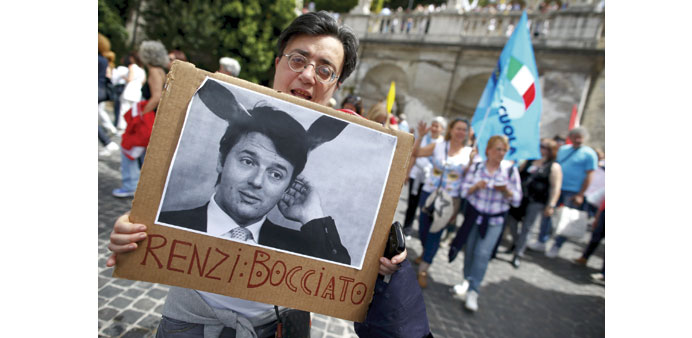Reuters
Rome
Teachers and students across Italy protested yesterday against reforms that Prime Minister Matteo Renzi says are vital to fix the country’s sub-standard schools but his critics reject as unfair.
Renzi’s “Good Schools” plan, one of several reforms he has proposed to “restart” Italy, includes hiring 100,000 teachers on permanent contracts – many of them current part-timers – and offering pay increases based on merit rather than seniority.
But the protesters said the plan leaves state schools under-funded, gives unfair advantages to private schools and would fail to fix the fundamental problems of an education system often blamed for contributing to Italy’s economic weakness.
Italy spends less on education as a proportion of national output than all its main peers in the eurozone, according to Eurostat, and the drop-out rate is among the highest in Europe.
The Bank of Italy and international bodies give Italy’s school system a share of the blame for over a decade of labour productivity stagnation that left the country badly equipped to battle a continent-wide recession.
“This (reform) does not respond even slightly to schools’ real needs,” said Valentina Nardoni, 39, a teacher marching in Rome. “There are first-class schools and second-class schools, and the ones in difficulty continue to suffer more.”
Education Minister Stefania Giannini said it was hard to understand the protesters’ anger.
“We respect strikes but are puzzled by the reasons,” she said on Twitter. “With ‘Good Schools’ we’re going back to investing in education.”
Renzi has put aside €3bn in this year’s budget for the reform, which was approved by cabinet in March but now faces a long approval process in parliament.
Critics saw his insistence that the new teachers can only be hired if the reforms are passed as another case of strong-arm tactics after he pushed through an electoral law on Monday despite objections from many in his own party.
Plans to give more powers to headteachers to hire staff has also raised fears that clientelism, which already strangles development in some areas, will take hold in schools.
But the 40-year-old premier defended the reform in a televised speech, saying Italy’s 43% youth unemployment rate meant “the education system must change”.

A demonstrator holds a placard with a picture of Renzi and the words ‘Renzi: failed’ during a protest against education reform in Rome.
